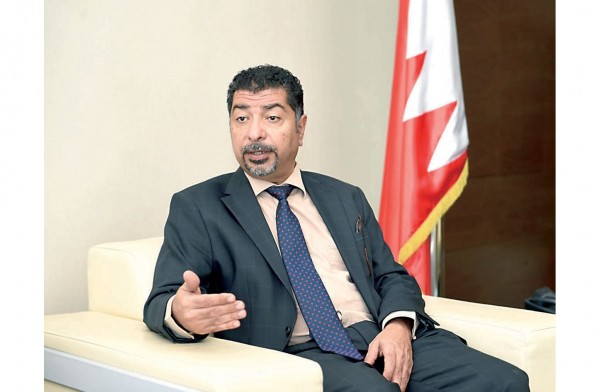Full Details of Meeting between Representatives of Authorities and Prisoners on Hunger Strike

2023-09-01 - 1:32 p
Bahrain Mirror: The London-based director of human rights organization BIRD, Sayed Ahmed Al-Wadaei, revealed the details of the meeting of the head of the National Institute for Human Rights (NIHR), affiliated with the Bahraini authorities, Ali Al-Dirazi, and an accompanying delegation, with representatives of the prisoners on hunger strike.
The details of the negotiations held with Ali Al-Dirazi, and two people accompanying him from the NIHR was as follows:
The meeting took place on Sunday, August 27, 2020 from 1:30 to 4:00 pm. The meeting was held with representatives from five buildings (7, 8, 9, 10 and 12), a prisoner representing each ward.
The meeting began when Ali Al-Dirazi and those accompanying him entered the hall of the old visitation building, introducing himself, "I am Ali Al-Dirazi, and we came to see the situation you are in, and what we can do."
The prisoners felt angry when they saw Al-Dirazi approaching and some of them decided to withdraw and return to the buildings. Some said: "These are unreliable parties, they falsify the facts." But eventually, the prisoners' representatives agreed to meet him and inform him about the demands.
The prisoners told Al-Dirazi, "You whitewash the image of the regime and you are a corrupt entity; you have no legitimacy (credibility) with the prisoners, they do not recognize you and the world abroad does not recognize you, and everyone knows your truth."
After a while of negotiations, the issues were discussed. The prisoners told him, "When you come to prison, you are taken to buildings where there are convicts of financial and drug cases. The situation of prisoners in these buildings is better than the buildings of political prisoners, because the doors are open for them."
The prisoners continued explaining that, "There are buildings dedicated to laundering the administration's image, such as Building 11, where the cells are open all day." Al-Dirazi said that prisoners have the right to go out to attend funeral ceremonies. The prisoners responded by saying: This is not applied to political prisoners, and gave an example of the death of Sheikh Ali Salman's aunt, noting that Sheikh Salman was not given the right to go out to attend the burial ceremony. They assured him that there is discrimination inside the prison and discrimination in the application of the law.
Al-Dirazi told them that the administration says it only registered 300 prisoners on hunger strike, to which the prisoners replied, "because not all strikers are committed to the sugar level test, they come to us at 2 am to take the tests."
The prisoners delivered a message to Al-Dirazi and told him, "You are worse than the Zionists, when the prisoners of Palestine go on hunger strike, some of their demands are met by the occupying entity."
During the meeting, the administration allowed the prisoners to leave the cells for two hours, and six rooms of each ward were allowed to leave their cells. Prisoners of 3 cells were only allowed to leave their cells at once and for 1 hour a day. The prison administration took photos.
The prisoners raised the following issues: the issue of isolation prisoners, where they confirmed that security isolation poses a danger to prisoners, and mentioned the case of Haider Al-Asfour, who was placed with convicts in murder cases.
Al-Dirazi asked for the names of those in isolation in order to meet them, the prisoners told him to meet with the following: Mohammad Fakhrawi, Professor Mohammad Sarhan and Ahmed Jaafar Hussein Al-Biladi.
Regarding the issue of having access outside the cells, and the sun exposure program, the prisoners demanded that the cells be opened from 7 am to 7 pm in wards and that the sunbathing period be for 4 hours, and that that it should be applied in the evening period, since the sun is blazing at noon, specifically in summer.
Al-Dirazi took notes without reservation.
As for the issue of family visits and the glass barrier, Al-Dirazi said, "We have reviewed the law, and the barrier is legal and impossible to be removed, but there is a solution to compensate that with special visits," and asked the prisoners: What do you think about private visits?
The prisoners said, "We need to have a special visit for each prisoner every 3 months, in which the prisoner can hug his family, but what the prison administration offered us as prisoners was that 4 prisoners should leave each building once a month for a private visit."
The meeting ended and Al-Dirazi and his team stayed for late hours, and met a number of isolated prisoners, including Ahmed Jaafar.
- 2024-05-08Bahrain: One Step Forward, Two Steps Back
- 2024-05-06Ali Haji May Face Imprisonment Again on Charges of "Penetrating a Restricted Area"
- 2024-05-01Was the Resumption of Flights with Iraq Expected?
- 2024-04-20Recent Releases in Bahrain: Something Has Changed
- 2024-04-04Return of Repression to Bahrain's Streets with the Crown Prince and Prime Minister's Blessing